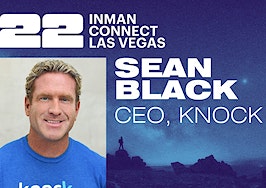In a shifting real estate market, the guidance and expertise that Inman imparts are never more valuable. Whether at our events, or with our daily news coverage and how-to journalism, we’re here to help you build your business, adopt the right tools — and make money. Join us in person in Las Vegas at Connect, and utilize your Select subscription for all the information you need to make the right decisions. When the waters get choppy, trust Inman to help you navigate.
You can blame some of it on COVID-19, but the real estate industry was shifting forward before the global pandemic made us all question the way we conducted business, and in general, went about our lives.
In the last public Inman Connect before the bug bit at the old venue in New York, an Australian company called MarketBuy was stalking the event, peering through the door of the American market to see if it might be ready for its unique, auction-based home sales model.
Two years and some months later MarketBuy believes it’s time. The company is not under any impression it will take over, but its timing does have merit as new approaches to buying and selling are gaining steam.
In fact, two open offer companies very much like MarketBuy are already with a foothold in the market, Doorsey and SparkOffer.
Zillow’s epic face-plant notwithstanding, Power Buyers are hanging around as are a number of other hybrid, buy-before-you-sell iterations of them and a growing contingent of lease-to-own and fintech-enabled buy and sell solutions.
The point is, consumers are open to new ways to buy and sell property, which is why MarketBuy’s Will Farmer, who spent 15 years at Realtor.com, decided to lead its official expansion into the states as its North American head of growth.
He had met MarketBuy’s executive duo John Hellaby and Dave Stewart before that January 2020 ICNY, as all Farmer did, he told Inman in a phone call, “was fly to where agents were and talk to them.”

Will Farmer
“Early on in their tenure they didn’t have the money to hire in the U.S. quite yet,” Farmer told Inman in a phone call. (MarketBuy launched in Australia in 2015.) Nor was Farmer quite ready to make a move, despite being intrigued by Hellaby and Stewart’s pitch.
But like so many others, once the constraints of covid eased, Farmer realized other avenues of work intrigued him.
“It made sense,” Farmer said. “My value is in connecting the industry to the people that need to know it, especially companies.”
If you’re not familiar, an open-offer model is not really an auction, that’s just the easiest way to gain a person’s attention at the top of the conversation.
MarketBuy posts a listing on its website and it’ll include all information, visuals and anything else a buyer would need to know about a home.
The idea is to then let others see competing offers, price, terms and everything else.
In doing so buyers will be more inclined to nudge an offer higher or improve it with fewer contingencies and more seller-oriented terms.
The real estate transaction relies on professional ethics to survive. It’s why the industry asks buyers and sellers to place so much trust in its advice and standards of practice. So why don’t listing agents share competing offer details openly? Why is there so much hiding behind, “bring your highest and best?”
There is tremendous value in cutting through the muck of offers that stand no chance of winning, and it can be reasonably argued that a transparent offer model would have collectively saved agents millions of hours during the frenzied 2021-22 market era.
MarketBuy has an option for sellers to hide the figures from other buyers, should the notion of sharing what the market is willing to tolerate still makes one anxious. The technology is quite flexible, allowing sellers and their agents to use it how they want.
Farmer cited BoxBrownie, another Aussie, tech-enabled real estate player that grew quickly by attending events and pushing its upstart personality into the places and conferences agents attended. Farmer said MarketBuy’s approach will be similar.
One place Farmer wanted to make sure Stewart got to know was Phoenix, the home of 72Sold, a company that condenses listing periods and showing schedules and gives all buyers the same weekend time frame in which to submit their best terms. In short, 72Sold trims off the fat from the traditional real estate transaction calendar.
It’s a very similar tactic to MarketBuy and others but largely offline and in person—and very successful.
Keller Williams inked a deal with 72Sold to leverage its model worldwide.
“We make sure that buyers each have enough time, but not too much time so that there are other buyers coming and going and they see that this home is really popular,” 72Sold founder Greg Hague told Inman. “We call that social proof. Creating social proof that a home is popular, desirable, and a competitive environment, which we believe has been missing in traditional real estate where homes are shown one at a time.”
Farmer said he has seen a lot proptechs come and go at all the events he’s attended over his tenure at Realtor.com.
“Any type of small company is a risk, and it’s also risky to start something this late in my career,” Farmer said. “But it’s good timing for a lot reasons.”
Farmer said he’s excited to help agents over the initial perceptions of MarketBuy’s model and to show them that it’s not made for only a multi-offer market, but in fact ideal for when the market has somewhat slowed because of how it increases competition.
“It works for both markets,” Farmer said.
Farmer’s inclusion was planned for some time, MarketBuy CEO John Hellaby said in a statement.
“Will is the consummate professional with a long history of strong sales and marketing results, achieved across varied market conditions and types,” Hellaby said. “We’re delighted that he shares our vision and passion for the industry, and we are lucky to have secured his signature in the post-covid era.”
Farmer and Hellaby of MarketBuy will be at Inman Connect Las Vegas, eager to pitch what it can do for the listings of the industry’s most engaged agents and leaders.













